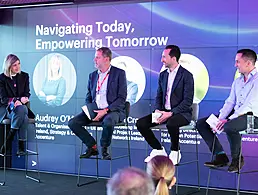As many companies prepare to transition to a new hybrid working model, what do they need to be aware of? Hays’ Sandra Henke shares her advice.
As the restrictions put in place across the world to combat Covid-19 begin to be lifted and plans to transition back into the office are underway, we can expect a very different workplace to the one we left behind and a different way of working. So, what do HR departments need to consider as they begin this transition?
For most organisations, phasing their employees back to the workplace will be a slow process, with a growth in hybrid teams likely to emerge as a result. But working in this way is new to many of us, so what should HR teams be considering as they plan for this new way of working?
1. Culture
Many organisations spend years building the culture of their company. It is the foundation of any business, exhibiting who they are and why they do what they do. So how do you not only reinforce that culture, but build on it too in a newly hybrid working world?
How we engage with one another is absolutely central to any consideration of organisational culture and how we work together moving forward. Ensure you have regular weekly team catch-ups. Everybody should be accustomed to video conference calls by now. Make sure they’re not all strictly work-related either, as having fun and sharing success should be a key aspect in any organisation’s culture. So, continue to use technology to keep in contact and make sure there is a sharing of good news stories from across the team and business.
It can take adversity and challenging circumstances to remind you of how deep the spirit and culture of a company is. I think there’s something quite beautiful in the obstacles reinforcing that aspect of our culture – not changing it, just reminding us of how important it is, so how we go forward with that having been deepened and enriched in our culture.
2. Inclusion
When the majority or some of your workforce isn’t present in the office, inclusion becomes more important than ever. Just because you can’t see someone, that doesn’t mean they aren’t there and an equal part of the team.
The definition of diversity and inclusion itself starts to change right now because everyone has had a diverse experience during the pandemic. This could be due to their living situation or even the kind of work and responsibilities they have been given. People will be returning to the office with different experiences and potentially different viewpoints.
Make sure you have the necessary open channels of communication so employees are able to voice their concerns or provide feedback. Ensure all employees, no matter where they are based, are taking part in company and team activities so they don’t feel left out.
Remind your team that you are all in it together. Every employee – whether they are in the office or at home – has a role to play in sustaining the company’s culture in the next era of work.
3. Wellbeing
Everybody’s remote-working experience is unique to them. Everybody will have been facing different challenges while in lockdown, whether that is due to childcare, isolation or limited space to work. Many will be concerned about their finances and the health and wellbeing of loved ones. This is in addition to the concerns people may have about returning to the workplace or continuing to work from home, all of which could have a considerable effect on the mental health and wellbeing of your employees.
Consider the frequency with which you are staying in touch with people and ensure you are providing them with the opportunity to be vulnerable. This will become increasingly difficult when you aren’t seeing your employees on a regular basis. In this situation, you can’t just assume that because someone is getting on with things that they are okay. Personally, that is something I have learned during this period, so I have started connecting with peers and colleagues more often and reaching out to them.
The current crisis will have no doubt negatively impacted a number of people and it has the potential to manifest itself overtime. So, I think at a time when we understandably are talking about mental health and anxiety a lot, we need to be incredibly mindful and careful and exercise our duty of care for people who are struggling or who have had a hard time.
4. Collective ownership
Collective responsibility is essential to ensuring the workplace is a safe place for everyone. When an organisation opens up its physical workspace, clearly the employer has a responsibility to make sure all their employees are as safe as possible and that all the necessary measures are in place around physical distancing, health and hygiene.
However, it requires every single person in your organisation to share that collective responsibility. So, this notion of all being in it together becomes very real – not just some hashtag. We actually are stronger together because every human in the workplace has a role to play in creating a safe workplace through their own behaviour.
It’s far less top-down than trying to enforce other behaviours and far more about emphasising that every individual has their part to play in creating an environment that brings everyone together safely, remotely or physically.
5. Learning and development
Another key area is from a learning and development point of view: how can you structurally ensure that your people leaders are equipped to deal with this new way of working? Your training programmes must prepare them with the necessary tools to manage a hybrid workforce. You will also have to consider whether your existing training is sufficient for your employees and the skills they will need in the new era of work.
But what does training look like when you can’t bring everyone together in a classroom? From our own experience over the past couple of months, you have to treat it completely differently to training that is delivered on site in a single room. You will have to work harder to keep people’s attention, so consider making it easier to digest by breaking the training up into segments.
Adapt the training you already have to complement this new era of work and ensure you are focusing on the necessary skills which may be currently lacking.
Preparing for change
The past few months have really demonstrated how important preparing for change is. It’s important to remember that it is a learning curve for all of us. There is not a leader in the world right now who doesn’t look back on the last couple of months and think, “I could have done that better”. At the end of the day, we’re all human and we’re all figuring a lot of this stuff out as we go.
This is quite an extraordinary time for us all, so if we allow ourselves to stand back and reflect on that it gives us plenty of opportunity to consider how we work, to question what worked before and what you want to take into the new hybrid working world with us. That’s quite a unique and fortunate position to find ourselves in as HR leaders.
By Sandra Henke
Sandra Henke is group head of people and culture at Hays. A version of this article previously appeared on the Hays Viewpoint blog.




